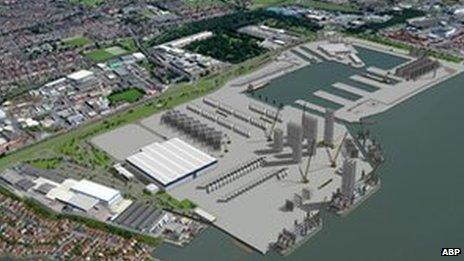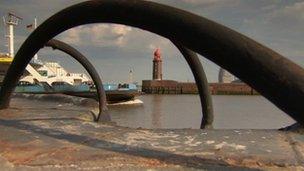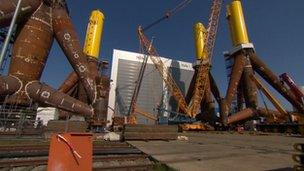'Green Port' approval: A wind of change for the Humber?
- Published

It is hoped Hull's £210m "Green Port" facility will generate hundreds of new jobs across the Humber region
Hull City Council has approved plans for a £210m "Green Port" in the city's docks to build and install offshore wind turbines.
Politicians and local businesses hope the new facility will act as a catalyst for the region to become a major centre for renewable energy, bringing investment and hundreds of new jobs.
Will the Humber become "the Aberdeen of offshore wind", as an executive of a local company recently suggested?
One example of what might happen is to be found across the North Sea in the German port of Bremerhaven.
The northern German city shares a similar history with the Humber ports, a fact reflected in its twinning with Grimsby.
Once a major fishing port, it fell into decline in the 1970s as the deep-water trawling industry died out.
The end of the Cold War accelerated its economic woes after the US Army shut down its massive supply base when the Berlin Wall fell in 1989.

A former fishing port Bremerhaven fell into decline in the 1970s
As jobs dried up in the 1990s the city's population fell from 150,000 to 115,000.
Fearing a further population exodus the city authorities drew up a redevelopment plan in 2001, focusing on attracting the offshore wind power industry to the area.
The regional government kick-started the redevelopment by setting up the Windenergie Agentur Bremerhaven/Bremen (WAB), an agency which promotes and coordinates the wind power industry.
According to figures from WAB, 5,000 new jobs in the renewable energy sector have been created since 2002. In the long term, they predict 20,000 jobs in construction and support industries by 2020.
WAB's managing director Ronny Meyer said that having people with the right skills was essential to developing the industry.
"It's a huge problem for the industry to get the right people," he said.
Mr Meyer said the ideal worker was somebody with experience of working in the offshore energy industry.
"Germany has no oil and gas offshore industry," he said. "So, maybe the UK is better placed."
Four turbine manufacturers have built factories in the city. Alongside the factories come allied industries such as steel production and specialist shipping companies.
Bremerhaven University has established bachelor and master degree programmes in wind energy.
Other establishments in the city carry out research and provide specialist safety training for offshore workers for the wind energy sector.
Maximilian Stierle, from turbine manufacturer WeserWind, said the city had been redefined by the arrival of the renewable energy sector.
He said: "Reinventing Bremerhaven and reinventing a kind of industry, like the offshore wind industry, is something people are very proud of.

Over 5,000 jobs have been generated by manufacturers such as WeserWind
"It's in the people's heads and minds that we are now doing offshore wind. And we've managed to reinvent a whole way of working here."
Taking hope from the experience of Bremerhaven is Hull City Council.
The authority's head of regional development, Mark Jones, has described the development as a "huge opportunity" for the city.
Mr Jones said that the training of potential employees had already started.
He said: "We've won a substantial amount of money in partnership with the East Riding council under the government's Regional Growth Fund, and £13m worth of that allocation is for skills and skills development for the renewable sector."
Despite the optimism on both sides of the North Sea, Ronny Meyer is concerned about the future prospects for the sector if European governments cut the level of financial support for green energy generation, currently provided through "feed-in tariffs".
He said: "We need stable feed-in tariffs otherwise all the investments done in the last 10 years may be stranded.
"Renewable energies need subsidies today, maybe not in the future. Today we need a stable political framework."
- Published9 May 2012
- Published11 January 2012
- Published13 December 2011
- Published9 February 2011
- Published20 January 2011